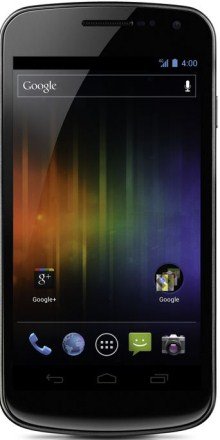Galaxy Nexus vs. iPhone 4S: Which is the Better Smartphone?



We may be primarily an Android site, but that doesn't mean we can't be objective when sizing up the competition. When the Galaxy Nexus is released later next month, it will go head-to-head with Apple's newest flagship device, the iPhone 4S. Now, granted, which phone you decide to choose will likely come down to personal preference, but that doesn't mean we can't compare the two devices based on their technical specs. A grain of salt is needed whenever comparing specs, but here's a look at how the two compare:
Design and Dimensions:
The Galaxy Nexus is taller and wider – yet also thinner – than the iPhone 4S. The majority of the Nexus is .35 inches thick, compared to the .37 inches of the iPhone 4S. However, at it's thickest point, the Nexus juts out to .45 inches, significantly thicker than the iPhone 4S. How much that matters depends on your personal preferences. Since the Galaxy Nexus is longer and wider, it may not slip as easily into a pocket but provides a larger screen for watching movies and playing games. We think the phone might actually be too large all around and are thus inclined to the easily-pocketable iPhone 4S. Feel free to yell at us in the comments section. WINNER: iPhone 4S
Display:
Both the Galaxy Nexus and the iPhone 4S have bright, vivid, pixel-rich displays. In fact, both are probably the best displays you can find on the market today. But there are a few key differences between them. The iPhone 4S comes with a 3.5-inch TFT Retina multi-touch display with a resolution of 960x640 pixels. Galaxy Nexus's display, on the other hand, is over an inch larger at 4.65 inches and 1280x720 pixels. You won't notice such an enormous difference when you're staring at the home screen of the Nexus, though, since the bottom part of the screen is taken up with buttons. However, the Nexus shines in video-playback mode, as the buttons then disappear and you have quite a massive display with which to watch media. Pixel-wise, the phones are a toss up. Both feature "retina-quality" displays, however the iPhone 4S features 330 pixels per square inch, while the Galaxy Nexus features 316 pixels per square inch. We'd pick the phone with the larger display, though, even if it has a handful less pixels. WINNER: Galaxy Nexus
OS:
Woah-no. I'm not even going to try to compare these two operating system. Obviously, they have huge differences and whichever I deem to be best will confine this spec review to a fanboy angle. But, quickly, the iPhone 4S has Siri, which everyone seems to adore, as well as a new(ish) notification tray. The Galaxy Nexus, meanwhile, features Ice Cream Sandwich with Android Beam, Face Recognition, re-sizable widgets and some serious multi-taking abilities. WINNER: Whichever floats your boat.
Processor:
Boasting aside, there aren't a whole lot of differences between the iPhone 4S's 1GHz dual-core Apple A5 processor and the Galaxy Nexus's Texas Instruments OMAP 1.2GHz dual-core processor. Both I'm sure produce a similarly snappy experience, even when serious multi-tasking or demanding gaming is required. However, based on specs alone, the Galaxy Nexus would seem to win this round. WINNER: Galaxy Nexus
Storage and RAM:
When it comes to RAM on paper it would seem the Galaxy Nexus beats the iPhone 4S in this category: the first phone to rock Android Ice Cream Sandwich has 1GB of RAM, compared to the iPhone 4S' 512 MB. However, this is yet another category which may or may not mean anything; it all depends on how well the phone uses the RAM. We'll have to test both to see. Storage-wise, neither phone offers an expandable SD card slot and both come in 16GB or 32GB versions. The only difference is that iPhonee 4S also comes in a 64GB version. WINNER: Tie.
Maximum Download Speeds:
This category is no comparison: the Nexus will have faster downloading speeds. The Galaxy Nexus will work on Verizon's 4G LTE network, which should allow it to have download speeds ranging from 9Mbps to 20Mbps or even more. The iPhone 4S, on the other hand, will mostly work on 3G networks (Sprint, Verizon), as well as AT&T's "4G" network, which will get theoretical downloads of 14.4Mbps. Even abroad, the Galaxy Nexus will run on faster HSPA+ networks that'll net it theoretical download speeds of 21Mbps. WINNER: Galaxy Nexus
Battery Life:
The short answer? We don't know right now. The long answer? Apple claims the iPhonee 4S has a battery life that allows for up to 8 hours of talk time or 6 hours of internet use, while the Galaxy Nexus has a 1750 mAh battery we'll have to test before we can make any judgements upon. As of right now, we just don't know which phone has the more capable battery life. WINNER: TBD
Camera:
The iPhone 4S packs an 8MP camera that can produce unusually high quality images with its f/2.4 aperture. The camera on the Nexus has 5MP. But, of course, megapixels aren't everything, and we've seen some truly beautiful cameras and videos shot by the Nexus. Features-wise, the iPhone 4S has image stabilization, face detection and autofocus. The Galaxy Nexus, meanwhile advertises Panorama photos, almost zero shutter lag and an app called "silly faces." The 4S camera has been getting rave reviews and it will be hard to beat. This is another category we'll have to test on our own, but preliminary results show the iPhone 4S coming out ahead. WINNER: iPhone 4S
Conclusion:
These are both excellent phones! While the Galaxy Nexus has a larger display, the iPhone 4S is arguably more pixel rich. Preliminary tests indicate the iPhone 4S to have a better camera, although we can't know for sure. Battery life is a toss-up but you can be sure both will last you through the day. Finally, the Galaxy Nexus will most certainly achieve faster downloading speeds. That's all for now, we'll let you know more after we've thoroughly tested both devices.




